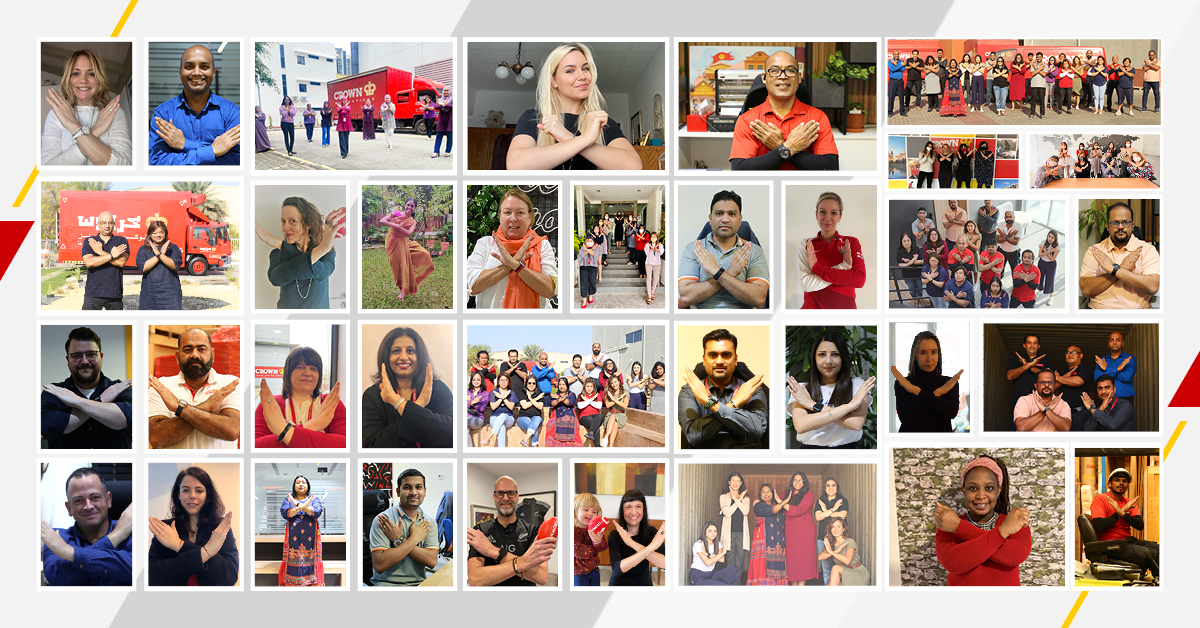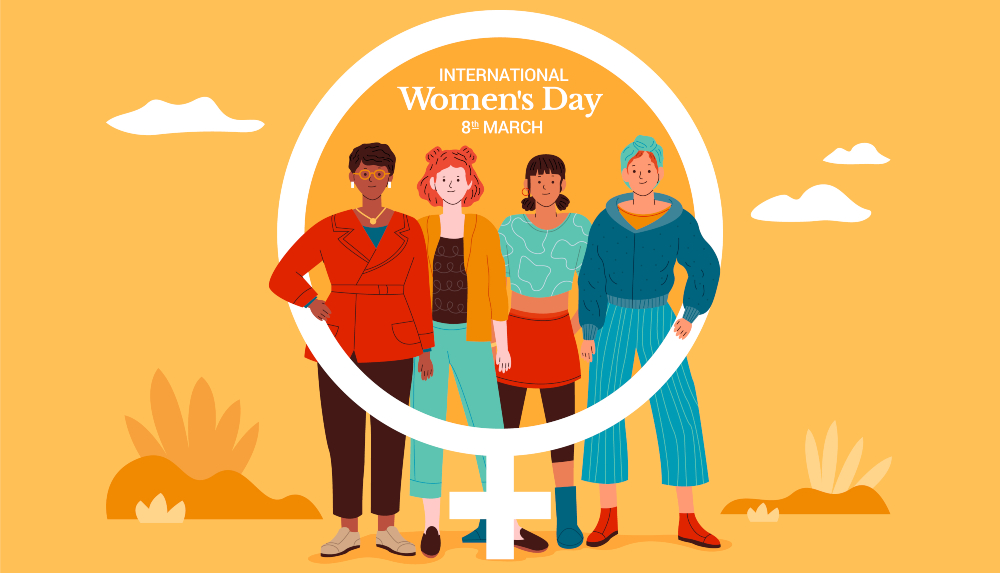International Women’s Day (IWD) is a global event celebrating the social, economic, cultural, and political achievements of women. For 2022, the IWD campaign is looking at unconscious bias and how we can collectively #BreakTheBias by helping to create a gender equal world. Women at Crown Worldwide Group recently answered questions on their experience with unconscious bias whilst reflecting on the challenges and opportunities experience as women in the workplace.
Interviewed are Savannah Dalzell, Operational Finance Analyst, Prague, Ganga Devi Karapenan, Global Account Manager, Singapore, Eleanor Holmes, Sustainability Co-Ordinator, London, Rani Anggita Kusuma Ayuningtyas, Mobility Consultant, Jakarta, Ezmaliza Embok, Invoicing Administrator, Kuala Lumpur.

What do you believe others can do to help create more equal workplaces?
Eleanor Holmes: First and foremost, I believe it’s vital for us all to recognize inequality, understanding that unconscious bias exists everywhere and that, without realizing it, you may have contributed to some form of prejudice within your career. We must all keep an open dialogue around these issues to understand how everyone’s experience in the workplace may differ based on their demographic. In this way we can learn how to be careful with the language we use, be respectful of others’ differences and make progress to more equal workplaces.
I am thankful for the strategic efforts Crown has made toward creating an equal, diverse, and inclusive workplace. There is training and initiatives around these issues available to all which helps us navigate through them.
Ganga Devi Karapenan: It’s critical to remember “equality in the workplace” isn’t a box-ticking exercise. Working towards equality means making sure you have an inclusive and safe work environment, providing equal opportunities, equal pay, and accepting and celebrating everyone for their differences.
People should find resources and educational materials that include examples of different types of discrimination, whether this is indirect discrimination, unconscious biases, or offensive language. This helps to make employees aware of issues they may not have recognized as discrimination previously. By being more educated, employees will be able to find ways they could work to improve their language or actions. Workplace leaders should work to create a culture that encompasses this. Holding sessions / meetings which display the company’s stance on equality helps to make this a core element of company culture. Start with attracting a diverse pipeline of qualified talent, a consistent interview process to eliminate any bias, and ensure ongoing fair practices throughout the employee lifecycle.
Creating an environment that encourages honesty, open communication, respect of individual backgrounds is key. Recognizing the importance of diversity and celebrating it, clarifies who you are as an organization and who you want to be.
Savannah Dalzell: Employers have an important role in ensuring that equal opportunities are given to all employees and potential employees. This means, when a company is hiring or deciding on who to promote, the decision should be based on the merit of the candidate’s work. Personal traits such as race, age, religion, gender, height, etc., should not be contributing factors to the decision. This is difficult because sometimes we can make assumptions about someone without realizing we are doing it. For example, there is a common unconscious assumption that taller people have better leadership qualities and hold greater authority than shorter people. Employers need to be aware of these unconscious biases and be vigilant in ensuring these do not affect the hiring process.
A second factor which I know this is easier said than done, comes down to individuals putting themselves out there despite any ‘stereotype’ they may have been given. If YOU see an opportunity, go for it. Don’t let a box you have been put in by someone else stop you. As well as your own growth, this will pave the way and set an example for others.
Getting total workplace equality involves many elements but giving opportunities to all and individual responsibility is a great place to start.
Do you believe that men and women have equal opportunities to contribute to the workplace?
Rani Anggita Kusuma Ayuningtyas: I believe that men and women have equal opportunities to contribute to the workplace. Despite this, we commonly see women being “steered” towards lower-paying occupations. This occurs when employers have stereotypes or biases about a certain group of people that influence their hiring decisions, such as assuming that women are better suited for childcare or customer service jobs.
However, since working at Crown Indonesia, I truly see that men and women have equal opportunities. This is shown as six out of eight department heads at Crown Indonesia are women. Due to advanced technology, flexibility in helping women be in work, stay in better paid jobs and advance in their careers is becoming more evident.
Savannah Dalzell: I think this depends on the industry, the culture of the workplace, and the person responsible for hiring. In some industries, there are major discrepancies between opportunities for men and women. For example, my male friend who became a kindergarten teacher, in a female-dominated industry, struggled to get a job offer. He faced many job rejections and was much slower at getting his first job offer compared to his female peers. In Crown, I have not noticed an unfair distribution of opportunities between males and females. This approach is great because every individual has something to offer despite their gender.
Eleanor Holmes: I think this is an area that is moving in the right direction, but I do not believe we are quite there yet and going forward we need a more intersectional approach to equality. There has been great progress over the last few decades. A recent study in The Guardian found that just over 39% of board positions in the FTSE 100 are occupied by women, and while a gender pay gap of around 15% still exists, this has been on a steady decline for some time.
However, the focus needs to shift towards recognizing that while women as a whole have increasingly more equal opportunities, this is hugely disproportionate against the opportunities for women of color, women in the LGBTQ+ community, and women with disabilities. There are undoubtedly existing prejudices within other demographics that impact equal opportunities for women of varied backgrounds.

What kinds of internal and external barriers make it difficult for women to reach the top?
Savannah Dalzell: Unconscious gender bias. It happens everywhere and does not just affect women. It comes back to people making presumptions about individuals based on gender without realizing they are doing it. An example I once heard is, “a father and son have a car accident and are both badly hurt. They are both taken to separate hospitals. When the boy is taken in for an operation, the doctor says, 'I cannot do the surgery because this is my son'. How is this possible”?
A large majority of people struggle to come up with the correct answer. The first time I heard this riddle I thought, “Ha! This is easy. The boy is adopted! Or maybe he has two fathers”. Only after did I consider that perhaps the doctor was his mother… a female doctor. What makes it worse is that my mother is a doctor herself.
So, why do our brains presume that a woman would not be a likely doctor? It shows that we can be unaware of these unconscious biases. Imagine the detrimental effects this kind of assumption can have in a workplace.
Rani Anggita Kusuma Ayuningtyas: In my opinion, there’s a lot of focus on external barriers to women’s success such as unequal pay and gender bias in the workplace. While these things certainly hinder the ability of many women to succeed, the key to unlocking tremendous opportunities for women is to simultaneously overcome the internal barriers that are holding us back. These include self-limiting beliefs, lack of confidence, staying in our comfort zones, and not tapping into others for help.
Ganga Devi Karapenan: Employers are also wondering how to strike the right balance of showing empathy, allowing for flexibility, and driving productivity in a time of economic crisis. The pressure and lack of options and support are causing many women to consider exiting the workforce. Women are more frequently forced to work fewer hours or drop out of the workforce altogether because they're balancing work and caregiving responsibilities. By the time they rejoin the workforce, salaries will likely have dropped because of the economic impacts of the pandemic. It's imperative that leaders / management focus on more creative solutions, implement transparent pay reporting, hiring, and promotion processes, and provide increased flexibility for working hours to help many women take on the psychological impact of being a 24/7 caregiver while maintaining a career.
Eleanor Holmes: I believe a huge barrier, especially for myself growing up, is a lack of representation. This deeply relates to gender stereotypes for different kinds of roles. For instance, many would typically envision a nurse, secretary, or teacher to be a woman, whereas a fireman, footballer, engineer, or CEO is traditionally seen to be a man. There are many people who don’t fit into these old-fashioned ideals, and I feel it’s important we give exposure to these stories to create role models and inspire future generations. We need to show children that this is in their reach – whether it’s a young boy wishing to be a nurse or a young girl who wants to be a world-class footballer.
As a child, I was fortunate enough to have people around me who encouraged me to be whatever I wanted to be and to go against the grain if there is something I want to do, but even then, I didn’t quite envisage myself in certain, male-dominated arenas. I am also very aware that many do not have this support.
How have the results of the ongoing pandemic affected your experience at work?
Ezmaliza Embok: As a working woman who is also a mother and wife, it has not been easy for me to go through the pandemic. My daily schedule has changed 360° since Covid hit. For the sake of daily survival, I must wisely plan the time to work from home and deal with children for their online classes. As someone that is required to provide food and clothing for my family, this routinely means taking my office time to do so. Often, I would replace my stolen time with a little extra time in the evening to complete my daily office tasks.
Overall, I don’t like the situation of working from home because it creates certain limitations for me.
Rani Anggita Kusuma Ayuningtyas: The results of the ongoing pandemic effected my experience at work as time management can be challenging under the most perfect of circumstances. Factor in the distractions of home, my family, and there simply are do not seem to be enough hours in the day. I’m struggling to take control of my time by trying to work based on my working hours, do something to boost my productivity, and give me a sense of stability.
Savannah Dalzell: Overall, my experience at work has improved. I’m lucky to have been able to split my time between the office and home (two days in the office and three days at home). I get the best of both worlds! It would be interesting to see the statistics, but from my experience, if the environment is right, working from home can be just as (if not more) efficient as working from the office
Unconcious bias is still a present issue making it difficult for women to feel valued and celebrated. To learn more about how you can take action for equality, visit the International Women's Day website here.